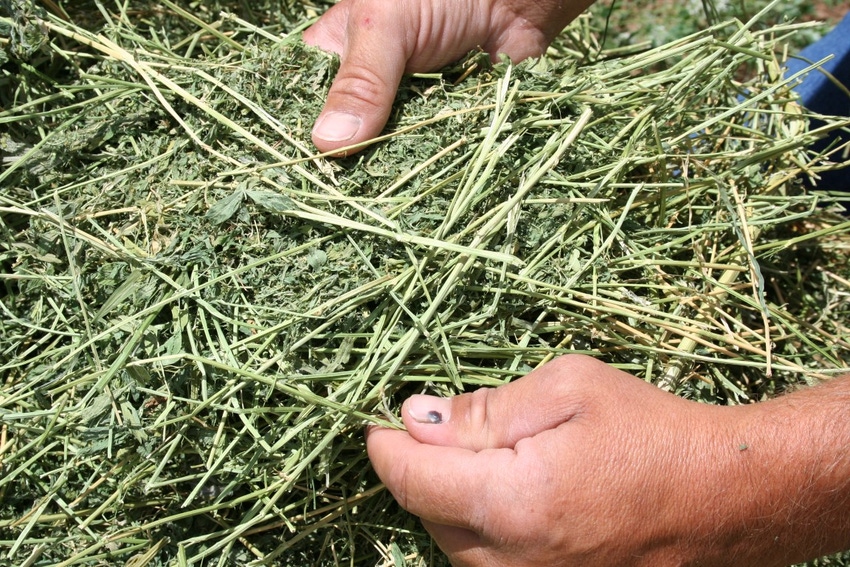October 12, 2016

Alfalfa and forage crops have a long, storied history in California - from their early success in the 1850s to a vital role today in the state’s $7 billion dairy industry which produces more than 20 percent of the nation’s milk supply.
Alfalfa and other forages are an ‘engine of food production’ with a more than $1.4 billion dollar per year farm gate value in California and over $20 billion nationally. Alfalfa hay is the fourth most important economic crop in the U.S., second in acreage in California to almonds.
California is the nation’s leading producer of alfalfa hay.
Western Farm Press Daily – free agricultural news delivered to your Inbox.
In spite of its economic and agricultural footprint, the alfalfa forage industry has not historically supported research to a significant degree. Alfalfa is the only major U.S. crop without a mechanism for funding research. New efforts by state and national organizations intend to change this.
California Forage Research Foundation
In September 2016, the California Alfalfa & Forage Association (CAFA) ratified the California Alfalfa & Forage Research Foundation (CAFRF), a non-profit 501(c)(3) public benefit corporation. It is open for business and has received thousands of dollars in donations from growers and industry members.
The foundation’s goal is to support and/or conduct research and educational activities related to alfalfa and forage crops.
It will fund research projects to address important topics, possibly including improved yields/profitability, pest management techniques, new water management approaches, forage quality/utilization improvements, harvest management strategies, new genetics and varieties, alternative forage crops, and sustainability and environmental issues.
“In this age, knowledge and information are critical to economic success,” says Jane Townsend, CAFA’s executive director. “Alfalfa and forage crops have a range of critical issues that are screaming for research and educational efforts.”
Alfalfa grower Brandon Fawaz of Siskiyou County, says, “These programs are brand new and just getting started, but they are a critical part of the need to move our crop ahead in the 21st century. Alfalfa growers have never asked for any crop subsidy, but the research needs must be met by voluntary grower efforts and university researchers.”
While various companies and public agencies may fund important research, they often do not reflect farmers’ interests or their needs. CAFRF is a foundation run BY and FOR alfalfa and forage growers with a grower board. Donations to CAFRF are tax deductible.
For more information, visit the foundation’s website at www.alfalfafoundation.org. Details on fund dispersal will be discussed at the 2016 California Alfalfa and Forage Symposium to be held Nov. 29 to Dec. 1 in Reno, Nev. - http://calhay.org/symposium/.
U.S. Alfalfa Farmer Research Initiative
Meanwhile, the National Alfalfa & Forage Alliance (NAFA) has undertaken steps to implement an alfalfa checkoff program on a national basis through their close links with the alfalfa seed industry.
Earlier this year, NAFA announced the start of the U.S. Alfalfa Farmer Research Initiative, also called the Alfalfa Checkoff Program. The national program is a farmer-funded investment in alfalfa-related research focused on forage production.
The initiative will be implemented voluntarily by seed companies who have agreed to join the program paid for by the farmers who plant alfalfa seed from participating seed companies.
Farmers will be assessed $1 per seed bag. One-hundred percent of the collected dollars will fund alfalfa research projects.
The program will be administered by a NAFA committee. The checkoff will support research in yield improvement, water conservation, storage and harvest systems, new uses, and other areas.
NAFA was also instrumental in gaining congressional approval of nearly $5 million over the last three years for the Alfalfa Seed and Forage Systems Research Program (AFRP). AFRP offers competitive grants for alfalfa research across the U.S. Several U.S. projects are currently underway funded by USDA.
“It is important that farmers step up to the plate to support research both in your local area and nationally” says Bob Ferguson, CAFA’s chair.
“The new Alfalfa Foundation will enable us to have an impact on research for California, and the NAFA checkoff will enable us to work with other states on national issues. These are voluntary programs that all alfalfa growers should support.”
California Alfalfa Research Foundation and National Alfalfa Checkoff program are emerging efforts to address critical issues with alfalfa.
You May Also Like




